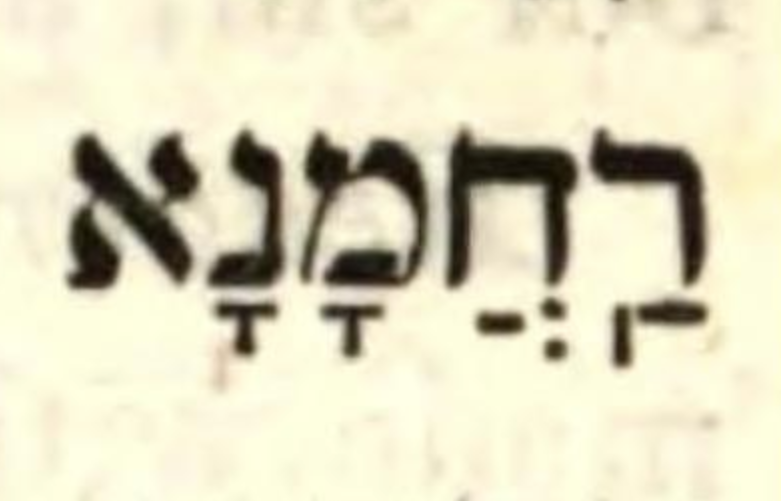| Source (Hebrew) | Transliteration (Romanization) | Translation (English) |
|---|---|---|
|
רַֽחֲמָנָא
אִדְכַּר לָן קְיָמַהּ דְּשָׂרָה דְּכִירָא. בְּדִיל וַיַּעֲבֹר׃ |
Raḥamana,
idkar lan qeyamah d-Sara dekhira. bedil va-yaŋaḇor. |
Motherly One,
remember for us Your covenant with Sarah the remembered, for the sake of the Verses of the Thirteen Attributes. |
|
רַֽחֲמָנָא
אִדְכַּר לָן קְיָמַהּ דְּרִבְקָה מְהַגְּנָא. בְּדִיל וַיַּעֲבֹר׃ |
Raḥamana,
idkar lan qeyamah d-Riḇqa mehagna. bedil va-yaŋaḇor. |
Motherly One,
remember for us the covenant with Rebecca the worthy, for the sake of the Verses of the Thirteen Attributes. |
|
רַֽחֲמָנָא
אִדְכַּר לָן קְיָמוֹהוּן דְּלֵאָה רַבְּתָא וּדְרָחֵל זְעֶרְתָּא. בְּדִיל וַיַּעֲבֹר׃ |
Raḥamana,
idkar lan qeyamohun d-Leä rabta ud-Raḥēl zeŋérta, bedil va-yaŋaḇor. |
Motherly One,
remember for us the covenant with Leah the elder and Rachel the younger, for the sake of the Verses of the Thirteen Attributes. |
|
רַֽחֲמָנָא
אִדְכַּר לָן זְכוּתַהּ דְּסֶרַח חַכִּימָתָא. בְּדִיל וַיַּעֲבֹר׃ |
Raḥamana,
idkar lan zekhutah d-Séraḥ ḥakimata, bedil va-yaŋaḇor. |
Motherly One,
remember for us the merit of Serach the wise woman, for the sake of the Verses of the Thirteen Attributes. |
|
רַֽחֲמָנָא
אִדְכַּר לָן זְכוּתַהּ דְּמִרְיָם נְבִיאֲתָא. בְּדִיל וַיַּעֲבֹר׃ |
Raḥamana,
idkar lan zekhutah d-Miryam nebiata, bedil va-yaŋaḇor. |
Motherly One,
remember for us the merit of Miriam the prophetess, for the sake of the Verses of the Thirteen Attributes. |
|
רַֽחֲמָנָא
אִדְכַּר לָן זְכוּתַהּ דִּדְבוֹרָה דַיְנָא. בְּדִיל וַיַּעֲבֹר׃ |
Raḥamana,
idkar lan zekhutah di-Debora dayna, bedil va-yaŋaḇor. |
Motherly One,
remember for us the merit of Deborah the judge, for the sake of the Verses of the Thirteen Attributes. |
|
רַֽחֲמָנָא
אִדְכַּר לָן זְכוּתַהּ דְּרוּת מְהֵימַנְתָּא. בְּדִיל וַיַּעֲבֹר׃ |
Raḥamana,
idkar lan zekhutah d-Rut mehēmanta, bedil va-yaŋaḇor. |
Motherly One,
remember for us the merit of Ruth the faithful, for the sake of the Verses of the Thirteen Attributes. |
|
רַֽחֲמָנָא
אִדְכַּר לָן זְכוּתַהּ דְּחַנָּה מְצַלְיָא. בְּדִיל וַיַּעֲבֹר׃ |
Raḥamana,
idkar lan zekhutah d-Ḥanna meṣalya, bedil va-yaŋaḇor. |
Motherly One,
remember for us the merit of Hannah the praying one, for the sake of the Verses of the Thirteen Attributes. |
|
רַֽחֲמָנָא
אִדְכַּר לָן זְכוּתַהּ דְאֶסְתֵּר מַלְכְּתָא. בְּדִיל וַיַּעֲבֹר׃ |
Raḥamana,
idkar lan zekhutah d-Éstēr malketa, bedil va-yaŋaḇor. |
Motherly One,
remember for us the merit of Esther the queen, for the sake of the Verses of the Thirteen Attributes. |
|
רַֽחֲמָנָא
פְּתַח שְׁמַיָּא לִצְלוֹתִין, בְּדִיל וַיַּעֲבֹר |
Raḥamana,
petaḥ shemayya liṣlotin, bedil va-yaŋaḇor. |
Motherly One,
open heaven to our prayers, for the sake of the Verses of the Thirteen Attributes. |
|
רַֽחֲמָנָא
צְלוֹתַנָֽא קַבֵּל בְּרַֽעֲוָא, בְּדִיל וַיַּעֲבֹר |
Raḥamana,
ṣelotana qabēl be-raŋava, bedil va-yaŋaḇor. |
Motherly One,
may our prayers be received willingly, for the sake of the Verses of the Thirteen Attributes. |
|
רַֽחֲמָנָא
שַׁתָּא טַֽבְתָּא אַיְתִי עֲלַן, בְּדִיל וַיַּעֲבֹר |
Raḥamana,
shatta ṭaḇta ayti ŋalan, bedil va-yaŋaḇor. |
Motherly One,
let us have a good year, for the sake of the Verses of the Thirteen Attributes. |
|
רַֽחֲמָנָא
תּוּב מֵרֻגְזָךְ, בְּדִיל וַיַּעֲבֹר |
Raḥamana,
tub mē-rugzakh, bedil va-yaŋaḇor. |
Motherly One,
turn back from your anger, for the sake of the Verses of the Thirteen Attributes. |
|
רַֽחֲמָנָא
וְלָא נֶהְדָּר רֵיקָם מִן־קַמָּךְ, בְּדִיל וַיַּעֲבֹר |
Raḥamana,
v-la néhdar rēqam min qamakh, bedil va-yaŋaḇor. |
Motherly One,
that we may not return empty-handed from Your presence, for the sake of the Verses of the Thirteen Attributes. |
This is a modern piyyut inspired by a traditional piyyut by an unknown author.
Source


